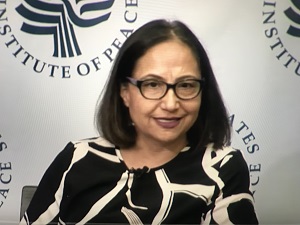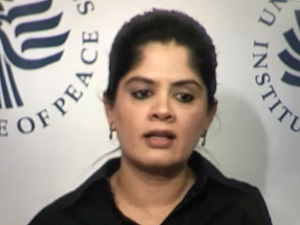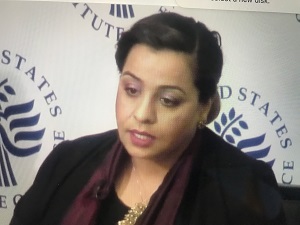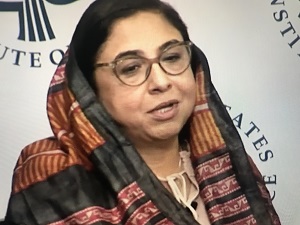Reflections from Afghan Women at USIP
By Elaine Pasquini

Washington: Eleven months after the Taliban took control of Afghanistan, women and girls in the country are still suffering the loss of their basic human rights of education, freedom of movement, and the ability to work outside their homes. At the same time, Afghans able to flee the country face challenges of resettlement as refugees in the United States.

Belquis Ahmadi |

Lima Ahmad |

Muzhgan Sadat |

Palwasha Hassan |
On June 27, the United States Institute of Peace hosted a panel of Afghan women to discuss the situation. The event was part of a series highlighting themes from Imagine: A Reflection on Peace, a multi-media exhibit from USIP and the VII Foundation on display at the institute through August 1 that explores the challenges of peacebuilding through an immersive look at societies that suffered and survived violent conflicts.
“While the conditions have fundamentally changed in Afghanistan since the fall of Kabul, supporting Afghan women during these challenging times remains our core priority,” said Belquis Ahmadi, senior program officer at USIP. “The news of the Taliban stripping away the most basic rights of women and girls and vulnerable Afghans is a painful reminder of the unsuccessful efforts to achieve durable peace and stability in Afghanistan. Once again, Afghan women and girls are left with the consequences of this failure.”
Reflecting on the June 22 earthquake in southeastern Afghanistan which killed more than 1,000 people, Ahmadi noted that the lack of women doctors in those provinces is a cause of great concern. “I hope this will be a wake-up call to the Taliban that in the society there is a need for women to be involved and active in all sectors of society, including health,” she said. “If they don’t let girls go to school, how are they going to become doctors and how will they be able to treat women and girls and others?”
Lima Ahmad, a PhD candidate at Tufts University, discussed the lack of coordination in evacuating and resettling Afghans.
“Afghans that made it to the US don’t know what will happen to them,” she explained. “Those who remain in Afghanistan, or are in refugee camps throughout the world, do not know when, or if, they can come to the US. Now we have to realize that all of those Afghans are human beings, and they still have the same rights all humans should have according to the United Nations Charter.”
Despite the obstacles and uncertainties, however, Ahmad remains hopeful for the future. “I don’t think we have any choice but to be hopeful,” she said. Since the leaders of many Afghan organizations previously based in Kabul are now in the US, she recommended that these groups be given the lead in the integration process of refugees.
While the Taliban should be held accountable for their human rights abuses through an international platform, Ahmad is also concerned about the recent increase in ethnic conflict in Afghanistan. “Now we don’t see each other as human beings,” she lamented, calling for “transitional justice and healing, both individually and societally.”
Activist and writer Muzhgan Sadat is now in the United States after spending three months at a US military base in Qatar and then in Germany. “Now that I have a roof over my head and my family is here and I do not have to fear for my family, the miseries inside Afghanistan are haunting me and I feel guilty that I have left them behind,” she related. “I feel guilty that I could not do anything to save them…and stand with them.”
For ten months, she noted, the women have protested hoping that someone in the world would “hear their cries for help and hold the Taliban accountable for the crimes they have [committed] and continue to commit against Afghanistan.”
Palwasha Hassan, a senior fellow at the Institute for Women, Peace and Security at Georgetown University, said what gives her hope today “is the way women’s groups are trying to re-emerge and be part of the change, not to just accept the reality that they are stopped from working…but they are thinking how to navigate around all of the difficult circumstances and find their way back and forge a way for peace and stability where they are counted as equal human beings.”
“Women have always been important in the reconstruction process and positively engaged and made the best of the situation particularly in Afghan civil society,” she said. “They do not have the same baggage of corruption.”
Formal and informal institutions in which Afghan women previously were active still exist on the ground in Afghanistan, but they need support and encouragement from Afghan women outside the country in order to connect with the women inside Afghanistan. “We cannot change what happened in Afghanistan, but definitely we can change what is going to happen,” she said.
Hassan stressed the need for the US Congress to pass the Afghanistan Adjustment Act in order to clarify the legal status of Afghan refugees, “and to eliminate their feeling of living in limbo.” The bill allows certain Afghan evacuees to apply for permanent status after one year of being paroled into the country. “Afghans worked under difficult circumstances in Afghanistan, and I think they can contribute to any other society where they are embraced with open arms,” she noted. “We worked alongside of you for years inside Afghanistan and we need the Congress to support this bill.”
“[Afghan] refugees bring in a lot of expertise into this country,” Hassan said. “No one has the experience of 40 years of extremism, conflict, poverty and so many other difficulties under which Afghans have survived, built our skills, and tried to move forward in our life. We can contribute to this society as we did in our own society in Afghanistan.”
(Elaine Pasquini is a freelance journalist. Her reports appear in the Washington Report on Middle East Affairs and Nuze.Ink.)

